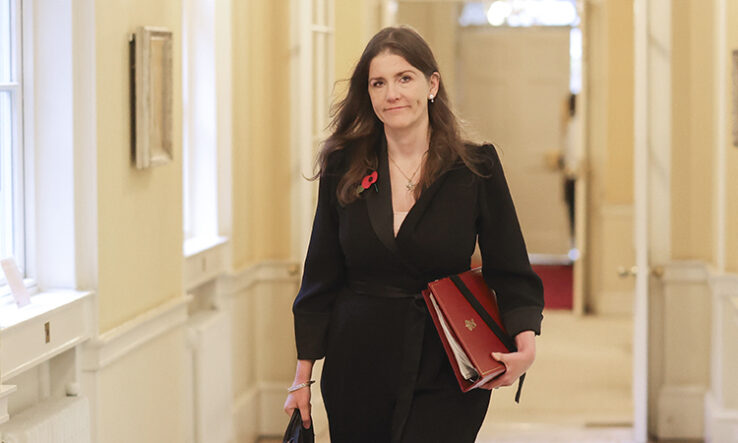
Image: Number 10 [CC BY-NC-ND 2.0], via Flickr
Policy experts brand science secretary’s intervention a “manifest threat to freedom of speech”
The science secretary has pushed the UK’s national research funding agency into suspending an equality, diversity and inclusion advisory panel in a move described as a “new low in political intervention”.
Science secretary Michelle Donelan wrote to UK Research and Innovation on 28 October accusing some members of the new panel of sharing “extremist views” on social media in relation to the Israel-Hamas war. She gave the agency one working day to respond “with an update on your plans, which I hope will include discontinuing this group”.
In a response on 30 October, UKRI said it had suspended the group with “immediate effect”. The funder’s credibility with the sector is now on the line as it investigates how it appointed the panel and decides its next move.
Its chief executive Ottoline Leyser has launched an investigation and said its findings will be used by the executive chair of UKRI’s Research England arm, Jessica Corner, “to come to a conclusion about the ultimate future of the…advisory group”.
Stephen Curry, a professor of structural biology who spent six years leading on equality, diversity and inclusion (EDI) at Imperial College London, said “Donelan’s intervention marks a new low in political intervention” in UK higher education and research.
He called it a “deeply worrying situation” and “a manifest threat to freedom of speech”.
The episode has led to a backlash in the research sector, with over 2,400 academics signing an open letter saying Donelan’s call was an “attack on individual freedom of expression and academic freedom”.
Kieron Flanagan, a professor of science and technology policy at the University of Manchester, described the situation as “extraordinary”.
“Disagreements between ministers and the leaders of arms-length bodies do arise from time to time,” he said. “In the end the minister is always going to have the last word, because they can defund, reorganise or abolish the body. “
Donelan—who recently spoke out against what she called “wokeism in science”—also cited broader concerns with UKRI’s approach to equality and diversity issues in her letter.
Paul Nightingale, professor of strategy at the University of Sussex Business School, said the political nature of EDI is causing serious problems for UKRI.
While the funder is treating it as apolitical, he said, “EDI is a complex area, and there isn’t yet enough shared agreement to make it a neutral, depoliticised thing that we can all agree on”.
Curry said: “It is ironic also that part of Donelan’s claimed motive is to ensure political impartiality on the EDI advisory group. [Such issues are] intensely political because they are still in flux within our society and within our universities.”
He added that EDI work “is important because it is attempting to address long-standing inequities and cultural problems within our HE institutions so that they can become even more productive. It is desperately disappointing that the secretary of state has opted to hammer UKRI on this issue with such a blunt instrument.”
Research Professional News has approached UKRI and the department for science for comment.
This article also appeared in Research Fortnight and a version appeared in Research Europe